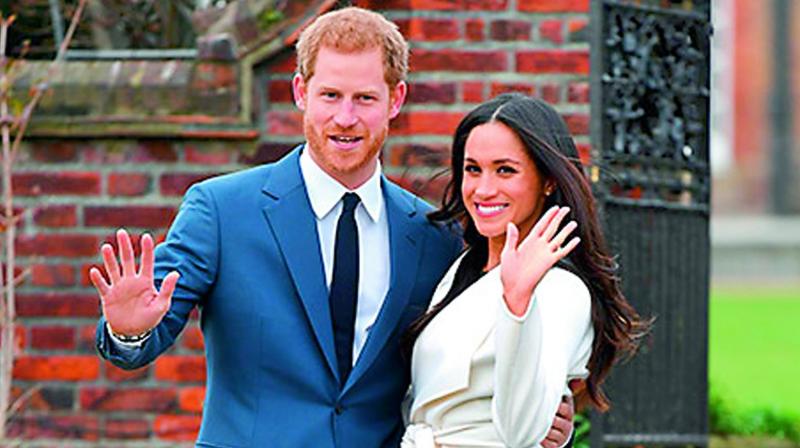Blue-blooded: Why a fairytale wedding matters

The wedding of William to Kate Middleton in April 2011 had led to an increase of 3,50,000 visitors to the UK compared to the same month the year before.
There are conflicting reports of estimates of the boost the British economy will get from the much anticipated wedding of Britain’s Prince Harry to American TV serial actress Meghan Markle. While optimistic reports have it that the May 19 wedding will provide a £500 million boost at least, others see the spinoff from the somewhat low-profile wedding as not so encouraging.
The one point in favour of the positive forecast is that the younger prince is marrying an American and trans-Atlantic tourist traffic could bring in the big spenders. A second factor is the fall of the pound sterling against the dollar in post-Brexit Britain. The weak pound may encourage more spending with Americans splashing their dollars.
Figures from the Office for National Statistics show that the wedding of Harry’s elder brother William to Kate Middleton in April 2011 had led to an increase of 3,50,000 visitors to the UK compared to the same month the year before. Business valuation consultancy Brand Finance predicts a similar surge this May. Tourism, travel, hotels, celebratory parties, memorabilia including T-shirts, mugs and pottery are expected to bring in about £350 million, besides free advertising for Britain that could be worth £100 million.
A word of caution here as other reports suggest the opposite — “Past royal weddings have had little impact on the economy, or even held back growth, as was the case with Prince William and Kate Middleton’s wedding in April 2011,” The Telegraph said. However, VisitBritain, the tourism agency, estimates that 41.7 million visits from overseas will be made to the UK this year generating £26.9 billion.
There is nothing quite like a royal wedding to get the UK going. Lively competition among the tabloids brings out all facets of the event, including some prurient stuff like the one coming out of Meghan’s estranged half brother. Perversely or not, all of it goes towards sustaining interest in the royal house of Windsor, a living advertisement for benevolent monarchy that is symbolic as it is nowhere near being in power.
The Crown on Netflix has been portraying all events around the monarchy in great detail, dramatised rather than fictionalised. The one standout factor about the monarchy that it doesn’t quite bring out is how good the royals have been for the country’s image. Half the tourists from the USA are said to be admirers of royalty, however steeped in democracy they have been since 1776.
The ceremonially spectacular wedding of the parents of Princes William and Harry was a landmark event in British history. In a nation hit by recession and flooded with economic doubts, the wedding in 1981 came as a boon, like a hit film to box office takings. The nation went ballistic in its celebration, with commemorative products taking off like never before but, importantly, the wedding raised the feel-good factor several notches.
A picture-perfect princess came like a breath of fresh air to a dynasty that had been on the throne for at least 1,000 years. History was to take a different course in time, but the new princess altered the Royal House of Windsor forever, bringing to it compassion and understanding of other values from beyond the palace walls.
The wedding itself was a fairytale event and held at St Paul’s Cathedral in central London and dubbed the “wedding of the century”. A national holiday was declared and people celebrated it on Britain’s streets with unbounded joy. The choice of venue over that of the traditional Westminster Abbey was interesting because it made for greater seating capacity — over 3,500 guests — as well as a longer chariot ride of bride and groom through the city to make it a public spectacle.
As fairytales go, it was too good to be true. Within a year of such a wedding, the prince was to take on a royal mistress and it was all downhill from there. Princess Diana, mother to William and Harry, was the first person in the royal family to talk openly about her struggles with mental illness. The reality was bitter, so too her death in an accident in a Paris road tunnel, caused by chasing paparazzi. But if ever there was a wedding to be seen for its sheer pomp and pageantry, it was this union — watched by a global television audience in excess of one billion.
The Meghan-Harry wedding will be far less of a spectacle and to be held in Windsor Castle, tucked away outside London in Berkshire, far less visible than the showcase Buckingham Palace in London. While the economists worry if indeed the extra dollars will come in, the event itself is to be looked forward to — as an American actress breaches the walls of British Royalty, much as Hollywood actress Grace Kelly did all those years ago when she married her Prince Charming, Prince Rainier of Monaco.

